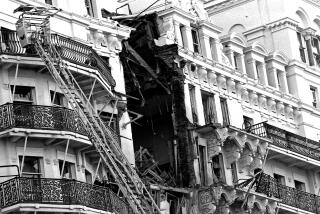Brits Can’t Escape Film’s Truth
- Share via
Surprise, Surprise! Some British lawmakers don’t like “In the Name of the Father” (“Brit Lawmakers Take Issue With ‘Name of the Father,’ ” Calendar, Feb. 4). David Gritten in his report on the British Parliament screening of the movie focuses on the criticisms of the English politicians and media who claim the filmmakers “compromised” the Guildford Four story by “blatant falsehoods.” In fact, what’s going on in England at the moment is a campaign of falsehood and innuendoes aimed at defusing the righteous rage cinema-goers, particularly Americans, feel about the injustices perpetrated against Gerry and Giuseppe Conlon.
British critics have fumed about certain details we changed: “Gerry Conlon was not in the same cell as his father.” Correct. But he was in the next cell for the last year and a half of Giuseppe’s life and spent most of every day with him. “Paul Hill did not eat sausages in Annie Maguire’s house.” Correct. Instead, he met her in a bar. “The lawyer Gareth Pierce did not find the note ‘not shown to the defense’ in the police archives.” Correct. She discovered it in bed in her home as she examined a bundle of documents from the police archive. “We compressed two trials into one.” Correct. But both trials had the same judge, the same prosecutor, and dealt with the same series of events. “British judges don’t say, ‘Case dismissed.’ ” . . . Enough already.
Let’s set the record straight. “In the Name of the Father” tells the true story of Gerry Conlon’s ordeal. He fled Belfast in 1974. He met up with Paul Hill in England. On the night, and at the time, of the Guildford bombing, Gerry Conlon met an unemployed man named Charlie Burke. Gerry Conlon returned to Belfast. He was arrested, flown to England and brutalized in a police station. He confessed. His father was arrested. Both received long prison sentences. The real bombers were arrested. They admitted the Guildford bombing. The British decided to ignore that admission. Giuseppe Conlon, an innocent man, died in prison. Gerry’s lawyer, Gareth Pierce, discovered the Charlie Burke alibi evidence. The Guildford Four were freed by the appeals court.
That’s Gerry Conlon’s story. That’s the film we made. The nit-picking by certain elements of the British press and the Establishment is accompanied by snide remarks about audiences on this side of the Atlantic: “Americans like to bring all politics down to Oedipal struggles and ‘the politics of the poisonal ,’ it’s no wonder they wet themselves in their hundreds at this touchy-feely field day” (Julie Burchill, London Sunday Times, Feb. 13).
Most despicably, victims are turned against victims. Some members of the Maguire family have been marshaled by the right-wing press to attack Gerry Conlon, as though he was the one who arrested the Maguires and sentenced them.
When it comes to Ireland, there are few impartial voices in Britain. Twenty-five years of war and terror, perpetrated by all sides, have guaranteed that anger is the emotion most prevalent in any discussion about The Troubles. But let’s not allow partisanship to cast doubt on the central truth of this film. “In the Name of the Father” is not the acting out of some conspiracy theory--it is a dramatic retelling of one of the most serious miscarriages of justice in British history. Nobody has challenged the basic facts at the heart of this film. Case dismissed.
More to Read
Only good movies
Get the Indie Focus newsletter, Mark Olsen's weekly guide to the world of cinema.
You may occasionally receive promotional content from the Los Angeles Times.










